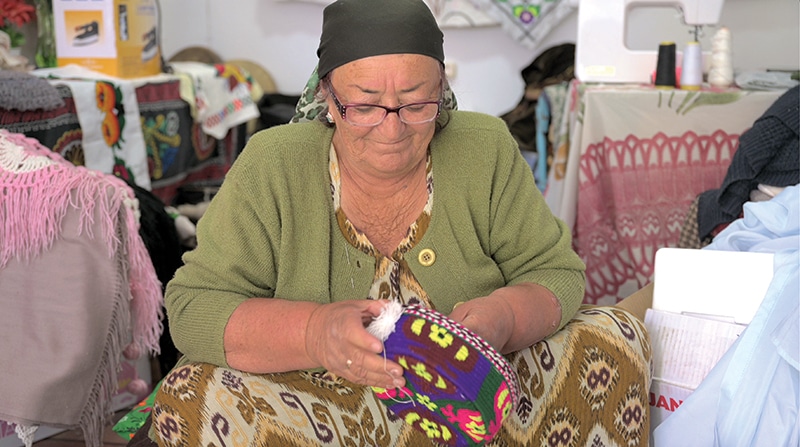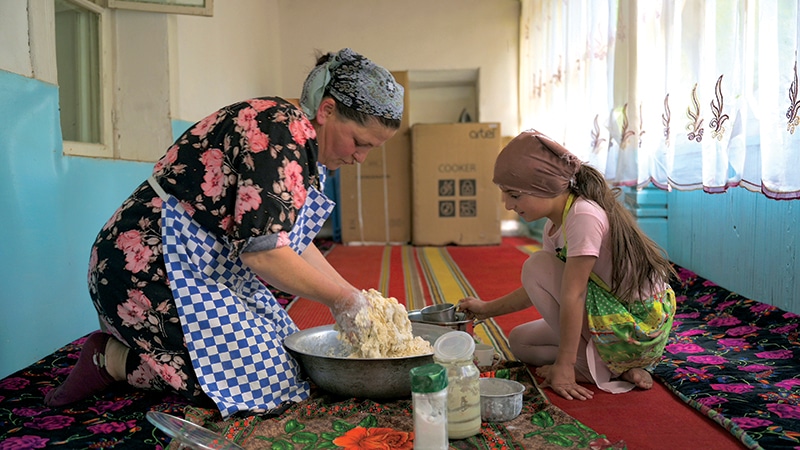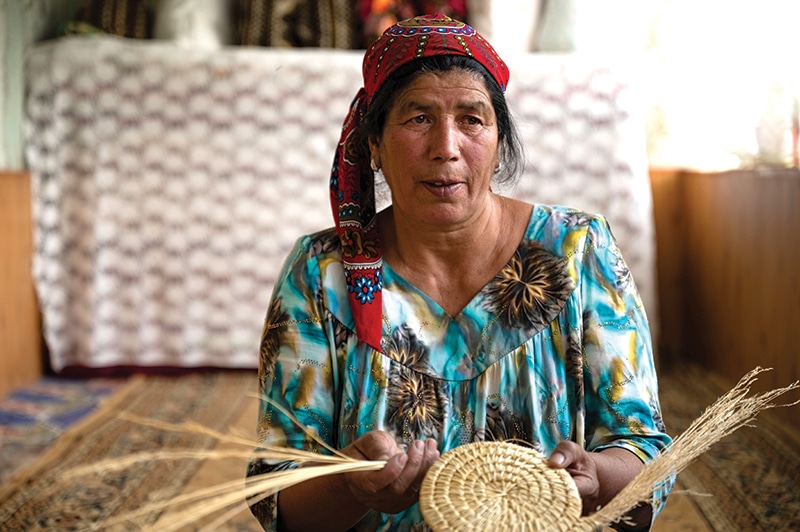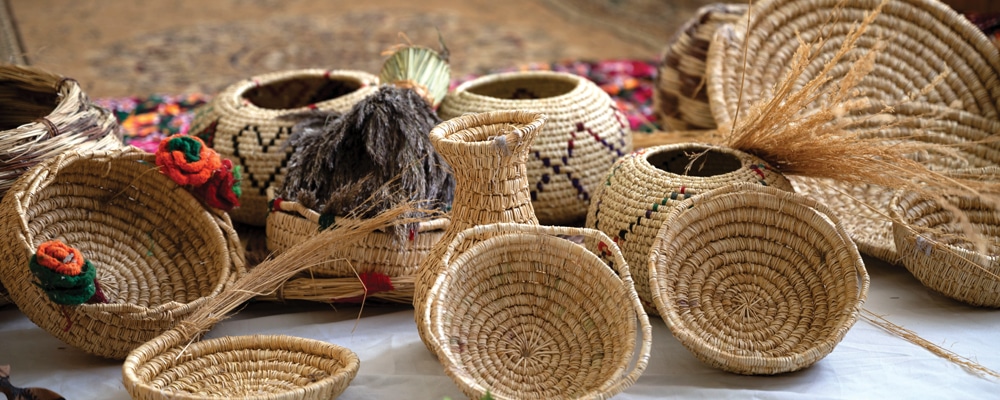The Women Reviving the Folk Crafts of Tajikistan
By Lynzy Billing
High up in the Pamir mountains of eastern Tajikistan, 65-year-old Alimabonu Dovutova’s nimble fingers carefully thread her needle.
Dovutova lives with her husband, son, his wife and her two grandchildren in the village of Khidorjev in the Roshtqala district of Tajikistan’s Gorno-Badakhshan region.
She leads me into a small room in her home which she has converted into a sewing workshop. Each week, two other women join her here and together they sew and knit products to sell in markets in the regional capital, Khorog, and the country’s distant capital city, Dushanbe. Through their needlework these women support their families. “We started doing this work because most of our husbands are in migration, and no one but us will help us,” says Dovutova.
Tajikistan has a rich history of handicrafts which reflect the culture of the nation and are often made using traditional techniques and materials. Dovutova remembers her grandmother and mother knitting, “I watched and learned these handicrafts from them,” she says, turning her needle to an embroidered hat.
Dovutova turned the embroidery and sewing skills she learnt as a child into her own handicraft business selling her products in markets and to tourists traveling to Gorno Badakhshan.
In 2019, the President of the Republic of Tajikistan, Emomali Rahmon, announced a three-year plan to revive the country’s folk crafts, rural development, and tourism. In 2021, Dovutova took part in Central Asia Institute’s first Women’s Livelihood training, an initial ten-day intensive workshop designed to equip aspiring female entrepreneurs with the tools and knowledge to succeed in businesses such as baking, sewing, and weaving.
Dovutova credits CAI’s workshop with helping her to start her business:
“CAI helped me a lot with the development of my business. Before, I did not know how to sell my products, but after attending these courses I learned financial literacy and how to sell them at the market, how to find clients, and how to price the products to get a profit. After the CAI training,
I opened a small workshop, hired two more women and we started working. From the income we get, we buy more materials and all the time, we are developing the folk crafts that we create. Since I started my business, I have participated in different exhibitions and received many diplomas and awards. I am very happy with the work I have done.”

In the future, Dovutova hopes to hire more women to work in the workshop:
“The want is great. In 2023, I took another course at CAI and got more practice and knowledge. Now, a lot of young girls are learning from me. I teach them in courses and in the future, I would like to attract more young girls and women to work to develop this craft so that as many women as possible can get out of poverty through self-employment. Many other women are interested in developing small businesses like mine and they come to the shop and watch.”
Dovutova’s success has been an inspiration to other women in her village.
Launched in 2019, CAI’s ASPIRE program has trained over 350 women in financial literacy, setting up and managing small businesses, and marketing their products, among an array of other skills. This past year, CAI provided additional support to approximately 100 of the women who participated in the initial training to help ensure the sustainability of their nascent businesses. This included supporting them to develop a business plan with specialized training in certain sectors (food processing, garment making), and the provision of equipment. A similar training is planned for an additional 50 women in October 2024.
Since completing the training, several women like Dovutova have started their own small businesses which provide income to support their families while preserving the arts and crafts of their region. They have regular meetups in a group they established where they share business ideas and tips from their experiences of growing their own businesses. Several of the women have even received presidential grants to support their work.
To the south of Khorog, the narrow valleys are lined with apricot and cherry trees, with waterfalls cascading behind them. Below, in the string of verdant villages that look out over the valley, traditional Tajik bread called “naan” is being cooked.
Naan occupies a special place in the country’s cuisine. It is served at every meal and treated with the utmost respect. Here in the mountains, the culinary artistry of baking is deeply embedded in the community, and recipes are passed down for generations.
“Cooking has been my favorite thing to do since I was a kid,” says 49-year-old Zarafshon Yoqutkhonova. Today, she is making bread in Gojak village in Shugnan, a district which follows the foaming Panj river, along the border
between Tajikistan and Afghanistan, and where the ruins of an ancient Silk Road kingdom once flourished. She lives here with her three children who she is single-handedly supporting after her husband moved to Russia some years earlier.
High up in these mountains, the birds are her alarm clock. She wakes early and starts preparing the dough for the day ahead. “I always wanted to learn how to cook and during my childhood I learned from my mother and grandmother how to cook different delicious dishes,” Yoqutkhonova says. “Now with the help of technology I can bake even more delicious and beautiful dishes than they did.” Her baked goods are pieces or art, each one lovingly crafted and designed.

She kneels in her kitchen delicately stamping the raw dough before it is placed in the oven in her garden. Next to her, a stack of the round bread lovingly wrapped up awaits its journey along the dusty stretch of beaten road onto shops in the bustling city of Khorog. “Our village is small with few stores, so it was difficult to do business here so most of my bread and cakes are sold in Khorog,” she says.
Like Dovutova, Yoqutkhonova took part in CAI’s business training back in 2019. Her neighbor, 39-year-old Sofiya Suhrobova joins her in her kitchen. She also took part in the training and has since developed her own bakery business. She is a widow supporting one young child.
“In 2019, the Women’s Council of our village invited us for cooking courses. They were held for women who were at home and unemployed, but who can cook and make a business out of it. Then CAI invited us both for training,” says Dovutova. “Before, we cooked and mostly gave everything [away] for free. We didn’t even know how many grams of ingredients and products we use. But after the training we learnt how many grams of products we need in each cake, how to price them, and how to send our products to the city and other districts.”
Yoqutkhonova talks about her business with joy and pride:
“In 2023, after business plan training with CAI, I started selling more of my goods in my village, and I started receiving baked orders for more weddings and from the school. Last year, CAI gave Suhrobova and me a dough mixer and a new oven, and now I cook cakes in this oven, and in the big oven I cook cakes for weddings. I can provide flatbread and pies for 150 to 200 people. I went from being unemployed to starting my own business and supporting my children with their education.”
In recent years CAI Tajikistan (CAIT) shifted its focus from training to supporting these women in their entrepreneurship and business development objectives. The program envisioned by CAIT includes end-to-end support such as market assessments, specific skill training, and provision of raw materials and equipment. CAIT links them with financial institutions, networking opportunities, marketing products, and other knowledge and skills to help them better manage/operate their small businesses.
“My favorite thing is basket weaving,” says 61-year-old Turamoh Qadamalieva. Qadamalieva lives in the village of Namangut in the Ishkoshim district in the southwest of the Gorno Badakhshan region.
Like Dovutova and Yoqutkhonova, she learned the artisan craft from her mother when she was a child, just as her mother had learned from her mother before her.
Qadamalieva’s grandchildren live with her and they are learning the art of wea-ving. “In September and October, the reeds ripen and turn white,” explains Qadamalieva. “We collect them as reserves for the winter.”
“At home we clean them for one or two hours in clean water, and then begin to weave them,” says Qadamalieva with a smile, showing her granddaughter how to thread the long reed.
She started her basket weaving business in 2010 and regularly participates in festivals, showcasing an array of products from vases to bowls and taking
custom orders.
In 2019, the women’s committee of Ishkoshim district informed Qadamalieva that a two-week training was being held by CAI in Khorog.
She says she learned how to better run her business and manage her finances. She also met other female entrepreneurs, trading their tips and finding support in one another. “I’m very grateful to the trainers. We want there to be many more training sessions in the future,”
she says.

Since taking part in the trainings, Qadamalieva started teaching basket weaving to 15 other women in her small village so that they, too, can earn their own income.
Today, Dovutova, Yoqutkhonova, and Qadamalieva use their skills passed down from generations before them to continue the country’s cultural legacy and support their families. They hope their children will do the same. “My daughter and my nephews also bake with me,” says Yoqutkhonova. “We cook together, and we share ideas of how to develop our business together.”
With your support, CAI can continue to assist entrepreneurs like Dovutova, Yoqutkhonova, and Qadamalieva to develop thriving businesses that provide income, create jobs, revive folk crafts, and inspire other women in the community.
Next year, CAI plans to assess the ASPIRE program — now in its fourth year — to determine which businesses have been successful and identify what additional support might be needed to help them flourish and expand. Other women whose businesses have faced challenges will be provided with additional oversight and supervision to help develop their capacity.

